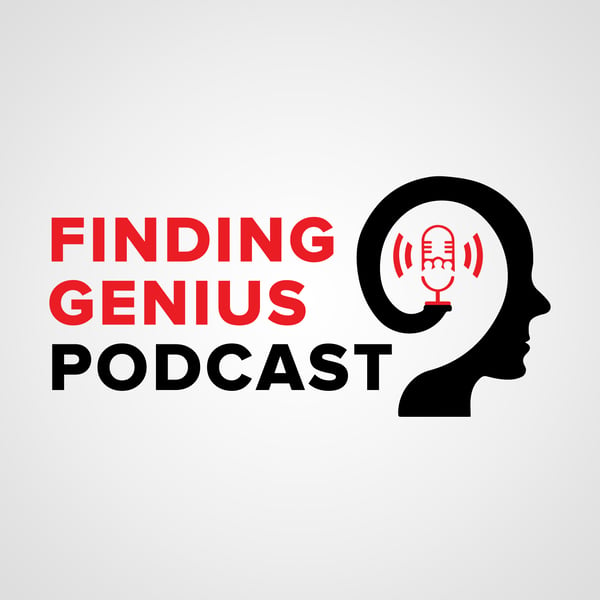Radiation Resistance Kills: Can Zebrafish Help Us Prevent It?
Finding Genius Podcast
Richard Jacobs
4.4 • 1K Ratings
🗓️ 4 March 2021
⏱️ 37 minutes
🧾️ Download transcript
Summary
When it comes to radiation therapy for cancer, cellular resistance to it can be a death sentence. What is the genetic basis for this resistance in humans? And what on earth do zebrafish have to do with it?
Well…a lot.
Tune in to learn:
- Why it’s nearly impossible to conduct unbiased research on mice and other mammals
- How zebrafish are helping researchers overcome a major obstacle to cancer drug discovery
- Why it may be more beneficial to focus on eliminating radiation resistance than on targeted therapeutics in cancer
When Samuel Sidi attended a French geneticist’s lecture in the early 90s, he had no idea the impact it would have on him and his career trajectory. The lecture was on a new zebrafish model, which would allow for the first time ever, unbiased forward genetic screening on a vertebrate.
Since vertebrates are more genetically and pathophysiologically similar to humans than the invertebrates commonly used for this research approach (e.g. Drosophila, worms, yeast), the zebrafish model opened the door to unprecedented and exciting opportunities in research—research that’s no longer limited by cost, time, and spatial constraints that previously existed for this approach in vertebrates.
The zebrafish model also addresses a concern of Sidi’s and other researchers: invertebrates lack many pathways and mechanisms that are deregulated in disease, which means they are lacking as a research model for human disease.
Sidi is currently an associate professor at Icahn School of Medicine at Mount Sinai, where he's directing research in the Sidi Lab. Unique among other researchers in the zebrafish model world, he is applying the unbiased approach to cancer drug discovery research.
During his post-doc, Sidi developed a zebrafish model that models the problem of resistance to radiation therapy in human cancer. And recently, his MD/PhD student used this model to run an unbiased drug screen, which led to the identification of a compound that can restore radiation sensitivity in mutant zebrafish.
The result?
“Totally unexpected,” says Sidi.
Tune in for all the details.
Learn more at these links:
https://labs.icahn.mssm.edu/sidilab/meet-the-team/
https://youtu.be/LnyxoxvtcPo
Episode also available on Apple Podcasts: apple.co/30PvU9C
Transcript
Click on a timestamp to play from that location
| 0:00.0 | For Get Frequently Asked Questions, how about advice from a real genius? |
| 0:07.0 | 95% of people in any profession are good enough to be qualified in license. |
| 0:11.0 | 5%? |
| 0:12.0 | Go above and beyond. |
| 0:13.0 | They become very good at what they do. |
| 0:15.0 | But only 0.1% are real geniuses. |
| 0:18.0 | Richard Jacobs has made his life's mission to find them for you. |
| 0:22.0 | He hunts down and interviews geniuses in every field. |
| 0:25.0 | Sleep science, cancer, stem cells, ketogenic diets and more. |
| 0:28.0 | Here come the geniuses. |
| 0:30.0 | This is the Finding Genius Podcast, the Richard Jacobs. |
| 0:35.0 | Hello, this is Richard Jacobs with the Finding Genius Podcast, |
| 0:41.0 | now part of the Finding Genius Foundation. |
| 0:43.0 | Today, I have a professor or associate professor of Samuel CD. |
| 0:47.0 | He works with developmental and regenerative biology, |
| 0:50.0 | all part of Mount Sinai, Icon School of Medicine. |
| 0:53.0 | I want to talk about potential cancer targets using zebrafish as a model. |
| 0:57.0 | Sam, thanks for coming. |
| 0:58.0 | Thanks for having me. |
| 0:59.0 | If you would, tell me about your research and why zebrafish. |
| 1:03.0 | Let's get into it. |
| 1:04.0 | So why is zebrafish? |
... |
Please login to see the full transcript.
Disclaimer: The podcast and artwork embedded on this page are from Richard Jacobs, and are the property of its owner and not affiliated with or endorsed by Tapesearch.
Generated transcripts are the property of Richard Jacobs and are distributed freely under the Fair Use doctrine. Transcripts generated by Tapesearch are not guaranteed to be accurate.
Copyright © Tapesearch 2025.

